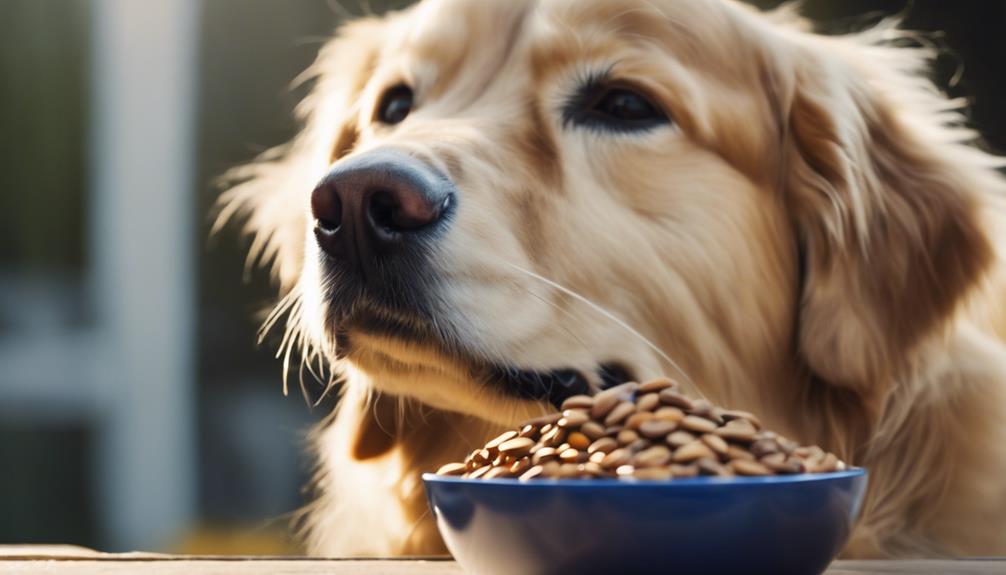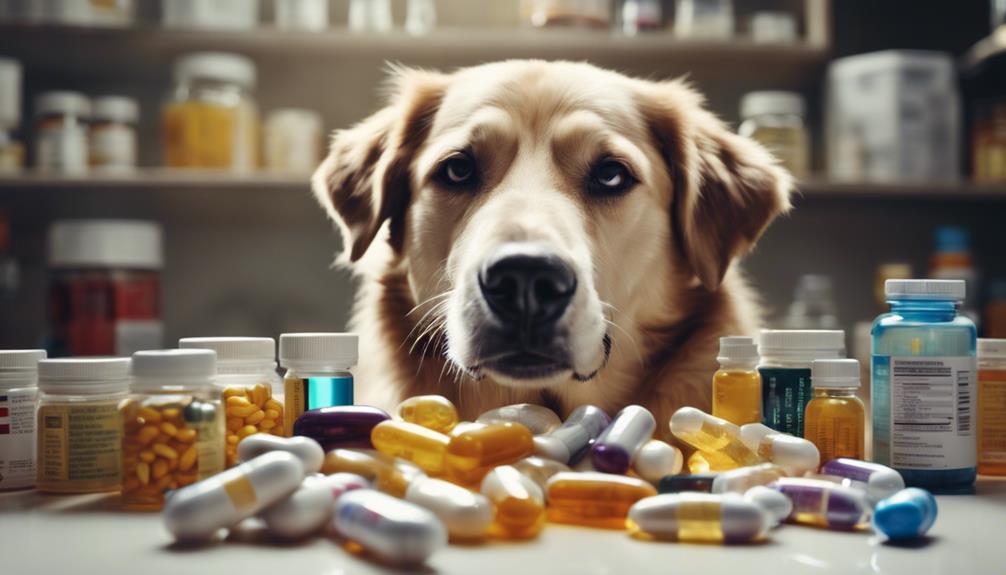Within the intricate realm of canine nutrition, the necessity of Vitamin E for our beloved companions emerges as a pivotal aspect that impacts their overall well-being.
As we navigate the complexities of providing a wholesome diet for our furry friends, understanding the significance of this vital nutrient becomes imperative.
From the potential benefits to the risks associated with supplementation, the journey towards comprehending Vitamin E's role in enhancing the health of dogs is an enlightening one.
Stay tuned to uncover the essential insights that will enable you to make informed decisions regarding your dog's diet and well-being.
Key Takeaways
- Vitamin E supports immune function, skin health, and overall well-being in dogs.
- Dogs can obtain vitamin E from natural sources like spinach, oils, nuts, and quality dog foods.
- Deficiency signs include coat issues and reduced immunity, while overdose can cause vomiting and diarrhea.
- Consult a vet for proper vitamin E supplementation tailored to your dog's needs and health status.
Importance of Vitamin E for Dogs
Vitamin E plays a crucial role in supporting the overall health and well-being of dogs by acting as a potent antioxidant and aiding in immune system function.
As an antioxidant, vitamin E helps protect cells from damage caused by free radicals, which can contribute to various health issues.
Additionally, vitamin E is essential for maintaining a strong immune system in dogs, enabling them to better fight off infections and illnesses.
Beyond these primary functions, vitamin E also plays a role in promoting healthy skin and coat in dogs.
Ensuring an adequate intake of vitamin E through a balanced diet or supplementation, when necessary, is key to supporting your dog's health and longevity.
Benefits of Vitamin E Supplementation
Given the crucial role of vitamin E in supporting dogs' overall health and well-being, exploring the benefits of incorporating vitamin E supplementation into their diet is paramount for optimal canine care.
Vitamin E acts as a powerful antioxidant, protecting dogs against free radicals that can cause cellular damage. Additionally, vitamin E supports immune system function, helping dogs ward off illnesses and stay healthy.
Furthermore, this nutrient plays a key role in maintaining a dog's skin and coat health, keeping them looking and feeling their best. By providing dogs with adequate vitamin E through supplementation, pet owners can help protect their furry companions' cells from harm and promote their overall well-being.
Essential Sources of Vitamin E

Exploring the diverse array of natural sources rich in vitamin E is essential for ensuring a well-rounded and balanced diet for dogs. Common dog food ingredients such as spinach and plant oils naturally contain vitamin E.
Quality dog foods are typically formulated to provide the recommended amount of this essential nutrient. Nuts, seeds, and certain fruits also serve as good sources of vitamin E for dogs.
While supplements can be considered under veterinary supervision, incorporating a variety of vitamin E-rich foods into the diet is optimal. By diversifying the sources of vitamin E in a dog's nutrition, pet owners can help guarantee adequate intake of this vital nutrient to support their furry companion's overall health and well-being.
Recognizing Vitamin E Deficiency Symptoms
Understanding the signs indicative of insufficient vitamin E levels in dogs is crucial for proactive health management and ensuring optimal well-being for our canine companions. Recognizing vitamin E deficiency symptoms can help address potential health issues promptly. Here are key signs to watch out for:
- Dull or dry coat
- Skin problems
- Muscle weakness
If you notice any of these symptoms in your dog, consult with a veterinarian to determine the appropriate course of action. Early detection and management of vitamin E deficiency can help maintain your pet's overall health and quality of life.
Managing Vitamin E Overdose Risks

To mitigate the risks associated with vitamin E overdose in dogs, responsible pet owners must be diligent in monitoring their canine companions' intake of this essential nutrient. While vitamin E is crucial for various bodily functions, excessive amounts can lead to toxicity in dogs.
Symptoms of vitamin E overdose may include vomiting, diarrhea, lethargy, and potential bleeding disorders. To manage the risks of vitamin E overdose, it is essential to follow recommended dosages provided by a veterinarian when supplementing your dog's diet.
Regular consultation with a vet can help ensure the correct amount of vitamin E is being administered based on the dog's specific needs. Monitoring for any signs of discomfort or adverse effects is crucial in maintaining a healthy balance of this vital nutrient.
Daily Vitamin E Requirements for Dogs
Meeting the daily vitamin E requirements is essential for maintaining optimal health in dogs. To ensure your canine companion gets an adequate amount of this crucial nutrient, consider the following:
- Recommended Daily Intake:
- Adult dogs should consume at least 50 IU of vitamin E daily.
- Puppies may have slightly different requirements based on their age and size.
- Senior dogs or those with specific health conditions may benefit from adjusted dosages.
Potential Risks of Excessive Intake

Excessive intake of vitamin E in dogs can pose significant health risks that pet owners should be aware of to safeguard their furry companions' well-being. While vitamin E is essential for various bodily functions, too much of it can lead to toxicity and adverse effects. Here is a breakdown of the potential risks associated with excessive vitamin E intake:
| Potential Risks of Excessive Vitamin E Intake |
|---|
| Digestive Issues like Diarrhea |
| Interference with Blood Clotting |
| Joint Issues |
| Toxicity |
It is crucial for pet owners to carefully monitor their dog's vitamin E intake and consult a veterinarian before adding any supplements to their diet to prevent these risks and maintain optimal health.
Consulting a Veterinarian for Guidance
Seeking guidance from a qualified veterinarian is essential when considering vitamin E supplementation for your dog to ensure their specific needs are met safely and effectively. Veterinarians play a crucial role in determining the appropriate dosage and monitoring the impact of the supplement on your furry friend. When consulting a vet for guidance on vitamin E supplementation, consider the following:
- Tailored Dosage: Vets can assess your dog's individual requirements and recommend the right amount of vitamin E for their optimal health.
- Health Considerations: Discuss any existing health issues or medications your dog is on that might interact with vitamin E supplementation.
- Regular Monitoring: Vets can help monitor your dog for any adverse effects and make necessary adjustments to the supplementation plan.
Monitoring and Adjusting Supplementation

To ensure the optimal health and well-being of dogs receiving vitamin E supplementation, careful monitoring and adjustment of the dosage may be necessary. Regular monitoring is crucial to assess the dog's response to the supplementation and to make any necessary changes.
It is recommended to consult with a veterinarian to determine the appropriate dosage based on the dog's specific needs, considering factors such as age, breed, weight, and overall health. Monitoring should include observing for any signs of vitamin E deficiency or overdose, such as changes in skin and coat condition, muscle weakness, digestive issues, or abnormal behavior.
Adjustments in supplementation may be required based on the dog's health status, ensuring that they benefit from the right amount of vitamin E without experiencing any adverse effects.
Ensuring Optimal Health With Vitamin E
To promote optimal health in dogs, incorporating vitamin E into their diet is essential for supporting various bodily functions and maintaining overall well-being. Ensuring adequate intake of vitamin E can be achieved through:
- Balanced Diet: Providing quality dog food rich in vitamin E sources like spinach, plant oils, nuts, seeds, and fruits.
- Supervised Supplementation: Administering supplements under veterinary guidance to prevent deficiencies or overdosing.
- Regular Monitoring: Observing for any signs of vitamin E deficiency or toxicity, and consulting a vet for adjustments in supplementation as needed.
Conclusion
In conclusion, Vitamin E plays a critical role in promoting canine health and well-being by protecting cells, boosting immune system function, and supporting overall vitality.
Understanding the sources, deficiencies, risks, and benefits of Vitamin E supplementation is essential for pet owners to ensure a balanced diet for their dogs.
Consulting a veterinarian for guidance on dosage and monitoring supplementation is key in maintaining optimal health and avoiding potential risks associated with Vitamin E intake.




